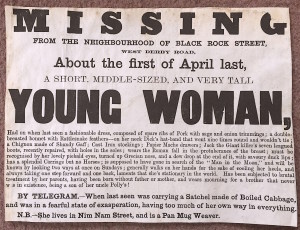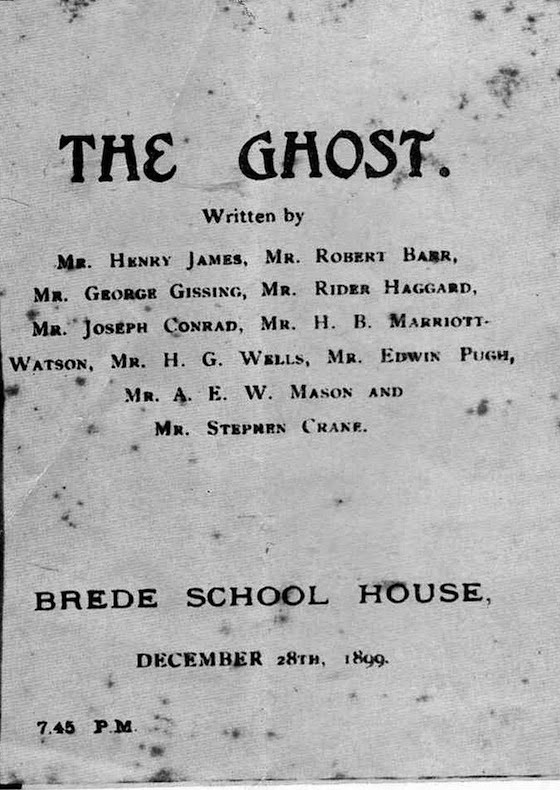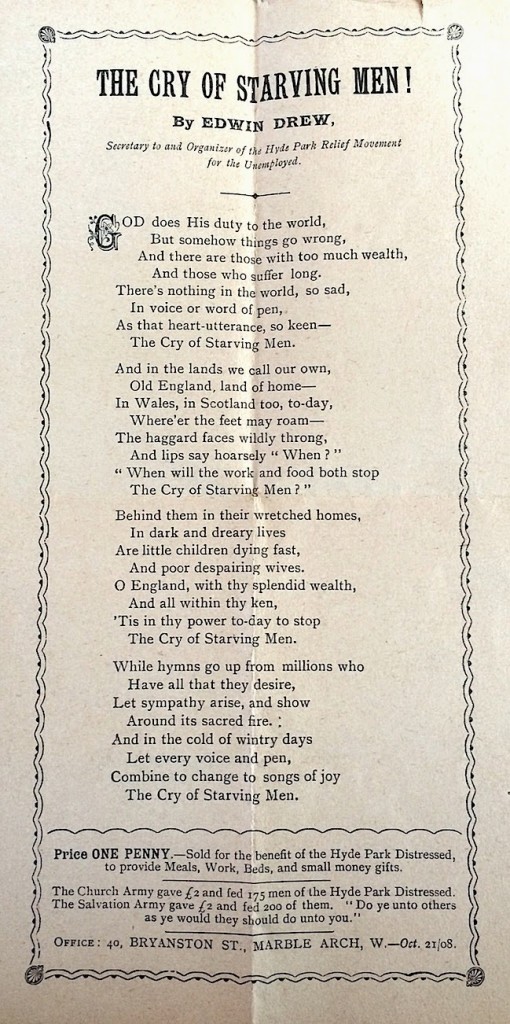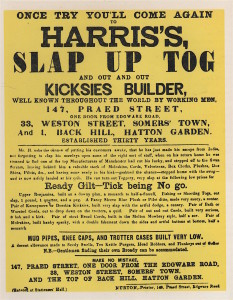 Discovered in that garden of visual delights, The Saturday Book (1960 ) is this quite extraordinary advert concocted by a working man’s outfitter by the name of Harris sometime in the mid nineteenth century. The copy is almost entirely composed of contemporary slang and cant terms. Harris’s three shops were all in central London locations, which might suggest that some of the colloquialisms were Cockney rhyming slang, or at least slang that was restricted to the capital and its environs. A few of the terms have survived to this day ( ’ slap up ‘, is excellent, as in slap up meal; ‘no-go’, as in not accepted ; cords, for corduroys; ‘grabbed the chance’; ‘out and out ‘; ‘tick’ for credit; ‘crib’ for home; ‘swag’ for booty), while others have been lost for ever. Who the hell are Tea Kettle Purgers and Head Robbers? What was the Swan Stream and the ‘Melton Mowbray style ‘? Something to do with fox hunting, perhaps? Are ‘Trotter Cases’ shoes?
Discovered in that garden of visual delights, The Saturday Book (1960 ) is this quite extraordinary advert concocted by a working man’s outfitter by the name of Harris sometime in the mid nineteenth century. The copy is almost entirely composed of contemporary slang and cant terms. Harris’s three shops were all in central London locations, which might suggest that some of the colloquialisms were Cockney rhyming slang, or at least slang that was restricted to the capital and its environs. A few of the terms have survived to this day ( ’ slap up ‘, is excellent, as in slap up meal; ‘no-go’, as in not accepted ; cords, for corduroys; ‘grabbed the chance’; ‘out and out ‘; ‘tick’ for credit; ‘crib’ for home; ‘swag’ for booty), while others have been lost for ever. Who the hell are Tea Kettle Purgers and Head Robbers? What was the Swan Stream and the ‘Melton Mowbray style ‘? Something to do with fox hunting, perhaps? Are ‘Trotter Cases’ shoes?
Some items of clothing advertised are self-explanatory ( moleskins, doeskins ),but others must be hunted down. I almost gave up on ‘broady’ until I found it online as meaning broadcloth. My reprinted Dictionary of Buckish Slang, University Wit and Pickpocket Eloquence (1811) was slightly more useful. The word ‘Quid ‘, meaning a a sovereign, dates from around 1688; to a Regency buck, however, it was a guinea, as was a ‘canary’ ; a ‘bob’ was a shilling and a ‘kick’ was a sixpence, though pluralised it meant breeches or trousers, as did kicksies. But the Slang Dictionary made no mention of Mud Pipes, Box Cloths, Plushes, Pilots, and Upper Benjamins. Perhaps these were of Victorian or purely Cockney origin. [RR]

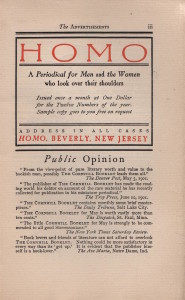
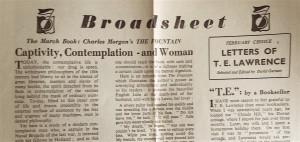 Found among the books in the working library of the actor Peter O’Toole (1932 – 2013) his copy of Letters of T.E. Lawrence (Readers Union, 1941.) O’Toole had surprisingly few books on or by Lawrence considering that this was probably his greatest role and the film that made him an international star. In the Reader’s Union edition was loosely inserted a one page wartime broadsheet keeping members of the book club informed about new publications. It was from an address at Wray Common, Reigate. This broadsheet / flier was dated February 1941and has a good piece (“T.E.”) on Lawrence by his friend and bookseller K.W. Marshall.
Found among the books in the working library of the actor Peter O’Toole (1932 – 2013) his copy of Letters of T.E. Lawrence (Readers Union, 1941.) O’Toole had surprisingly few books on or by Lawrence considering that this was probably his greatest role and the film that made him an international star. In the Reader’s Union edition was loosely inserted a one page wartime broadsheet keeping members of the book club informed about new publications. It was from an address at Wray Common, Reigate. This broadsheet / flier was dated February 1941and has a good piece (“T.E.”) on Lawrence by his friend and bookseller K.W. Marshall.